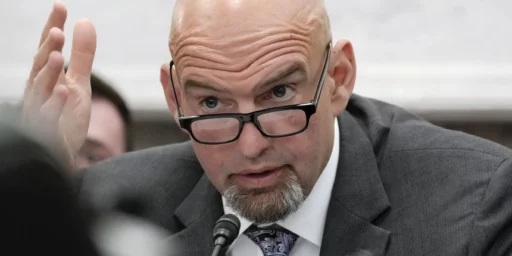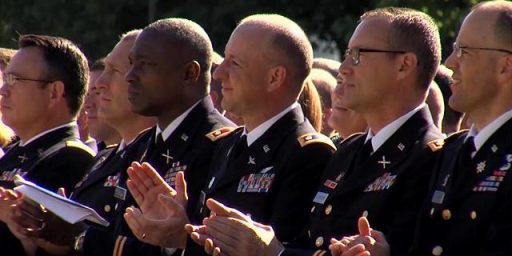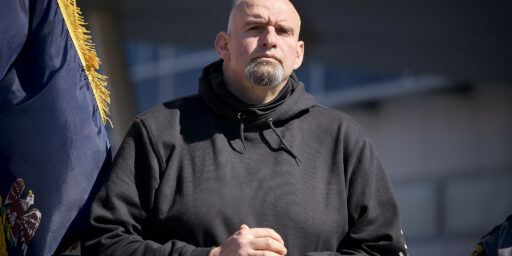Dealing with Troop Shortages
In today’s Washington Times, Rowan Scarborough reports on another sign that our military is stretched:
Wars Causing Shortage Of Officers
The Army’s commitments in Afghanistan and Iraq are draining infantry officers from combat-ready companies and battalions elsewhere in the world, according to an internal memo. The memo from the Army’s Human Resources Command in Northern Virginia, a copy of which was obtained by The Washington Times, said there is a 30 percent shortage — or about 100 majors and lieutenant colonels and an unspecified number of other grades. “[Units] are suffering very badly at all grades,” Lt. Col. Lee Fetterman, chief of the command’s infantry officer assignment branch, said in the June memo sent to infantry colonels in the United States and abroad. “Many of you are currently short officers.”
But Col. Fetterman, who recently returned from a combat tour in Iraq with the 101st Airborne Division, said in an interview that no unit deployed in combat in Iraq or Afghanistan is suffering shortages of these critical officers who lead companies and battalions fighting terrorist insurgents. The shortages are being felt by nondeployed divisions and in other billets Army-wide. In fact, he said, part of the reason for the shortage is that the Army is keeping manning levels for these officers at 105 percent in the war zones to replenish any units who lose men.
The second factor, Col. Fetterman said, is that the ongoing transformation of the Army’s 10 active combat divisions requires more officers. This is because divisions are becoming “modular” in mix-and-match components. The result is that divisions are creating more battalions on a smaller scale that can get to overseas hot spots faster. More battalions mean more officers to lead them.
“We are short infantrymen at all grades, but particularly at major and lieutenant colonel,” the Fetterman memo states. “Units deployed or deploying in the very near future will be filled to authorizations. Units recently returned from combat can expect to have shortages in all grades.”
Heritage Foundation analyst James Jay Carafano, in a NY Post column called, “No More Troops” (July 9) argues
The problem isn’t that the military is too small. It’s just structured to fight the last war in the last century. The result: Too many troops in the wrong uniform, in the wrong places, trained in the wrong skills to be of much use in the War on Terror.
Yes, our military is overstretched. Washington needs to do something about that. But, many of the ideas being floated by pundits and policymakers are simply wrongheaded.
Among the “dumb ideas” he debunks are bringing back the draft, refusing to call up IRR members, and a permanent increase in the size of the force for a short-term problem. Some of the quick fix solutions he offers:
* Get rid of the four-star generals in Europe. U.S. troop levels there are far below Cold War numbers. We really don’t need our top brass there anymore. Sure, the European four-stars will suffer bruised egos when left to talk with “lesser” U.S. generals. But winnowing our Old World brass and their staffs will free up 20,000.
* Turn ROTC training over to military retirees rather than active-duty personnel. That’s a few thousand more.
* Trade in some artillery and armor units for more Special Forces and military police.
Meanwhile, in an op-ed in today’s WaPo, Nathaniel Frank argues that the problem could easily be fixed by rescinding the ban on gays in the military.
The Pentagon’s recalls are targeting specialists with needed skills in intelligence, engineering, medicine, administration, transportation, security, and other key support and logistical areas. Under the gay ban, the military has expelled thousands of just such troops: 268 in intelligence, 57 in combat engineering, 331 in medical treatment, 255 in administration, 292 in transportation, 232 in military police and security, and 420 in supply and logistics since 1998. It also booted 88 language specialists (many of them Arabic-language translators and interrogators); 49 nuclear, biological and chemical warfare experts; 52 missile guidance and control operators; and 150 rocket, missile and other artillery specialists.
In certain badly needed specialties, the military could have avoided involuntary recalls altogether if it had not expelled competent gay troops in those fields: It is recalling 72 soldiers in communication and navigation but expelled 115 gay troops in that category; 33 in operational intelligence but expelled 50 gays; 33 in combat operations control but expelled 106. In total, while the Army is set to recall 5,674 troops from the Individual Ready Reserve, 6,273 troops have been discharged for being gay, lesbian or bisexual since 1998. The discharges continue, at the rate of two to three per day, despite alarming reports that the military is stretched dangerously thin and is overtaxing its current forces.
Update (1243): Phil Carter has some thoughts on the issue, including a rare worth-reading StratFor article.





